Alternatives to Sony’s New NEX Cameras
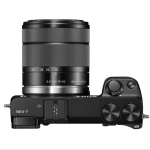 We’re convinced that MILCs (Mirrorless Interchangeable Lens Cameras) were an absolute stroke of genius in terms of digital camera design. They pair the portability of a compact with the amazing control and image quality of an SLR. If you’re in the market for an entry to mid-range digital SLR, you might want to consider an ILC instead.
We’re convinced that MILCs (Mirrorless Interchangeable Lens Cameras) were an absolute stroke of genius in terms of digital camera design. They pair the portability of a compact with the amazing control and image quality of an SLR. If you’re in the market for an entry to mid-range digital SLR, you might want to consider an ILC instead.
If you’ve been following the blog lately, you probably already know that we’re pretty enamored with Sony’s NEX-7, an MILCs, and while we can praise it until we’re blue in the face, it doesn’t change the fact that you aren’t going to find it anywhere – at least, not for a while. Thailand flooding has unfortunately upset Sony’s supply lines, and it looks like the NEX-7 won’t be available until April. So what can you do if you don’t want to wait that long (or if you simply don’t like the NEX line)? Well, we’ve got a list of some great alternative MILCs that’ll get the job done.
Rather than sit on the waiting list in hopes of getting the NEX-7 when it’s available in April, you may want to take a look at what Fujifilm has to offer. The X-Pro1 is expected to be released in February and offers an excellent combination of manual and automatic controls, all wrapped up in a retro-looking body. Don’t be fooled by the 16MP spec. Its APS-C image sensor is strategically placed closer to the lens for amazing image quality that actually surpasses the NEX-7 and rivals the Canon 5D Mark II. At about $1700, it’ll cost a pretty penny, but you can’t argue with its results.
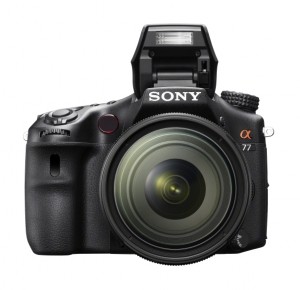 No, the A77 is not an MILC; it’s your mostly typical digital SLR, but it’s also your best bet at achieving NEX-7 level results. Apart from being a bit larger and heavier, the A77 has almost exactly the same components as the NEX-7. The A77 is also a bit more rugged, has many more lens choices, improved autofocus, and a larger battery.
No, the A77 is not an MILC; it’s your mostly typical digital SLR, but it’s also your best bet at achieving NEX-7 level results. Apart from being a bit larger and heavier, the A77 has almost exactly the same components as the NEX-7. The A77 is also a bit more rugged, has many more lens choices, improved autofocus, and a larger battery.
3: Sony NEX-5n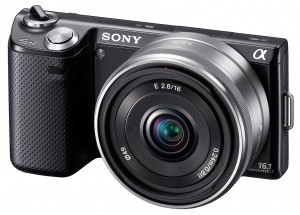
Even though it’s the NEX-7’s little brother, the NEX-5n doesn’t skimp on much. It drops down to a 16MP APS-C image sensor (from 24MP on the NEX-7), but image quality only suffers slightly. It also loses the built-in flash and viewfinder, but makes up for it with a smaller and significantly lighter frame. At about half the price, it’s also a lot nicer to your wallet than the NEX-7.
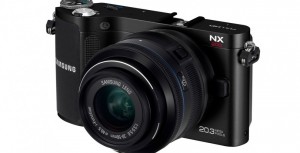 The NX200 offers somewhat of a middle ground between the NEX-5n and the NEX-7, and its roughly $900 price tag reflects that. It has a great 20MP APS-C image sensor, significantly outclassing Nikon’s similarly priced V1. It’s also a bit lighter and slightly more compact than most MILCs of its class. Lastly, the NX200 has a wide variety of lenses available (a lofty 11), compared to other MILCs.
The NX200 offers somewhat of a middle ground between the NEX-5n and the NEX-7, and its roughly $900 price tag reflects that. It has a great 20MP APS-C image sensor, significantly outclassing Nikon’s similarly priced V1. It’s also a bit lighter and slightly more compact than most MILCs of its class. Lastly, the NX200 has a wide variety of lenses available (a lofty 11), compared to other MILCs.
5: Nikon 1 V1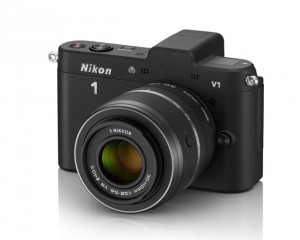
The Nikon V1 doesn’t really compete with the NEX-7, but as an alternative to the NEX-5n, it does make a decent choice. With a smaller image sensor and larger price (about $900) than competing MILCs, the V1 is a pretty tough sell, but it does have a few unique features (60fps burst and high-speed movie mode) and handful of great Nikkor lenses available as well as quality Nikon accessories.



Can I ask how mirrorless cameras improve images? Sorta clueless here.
The mirror in an SLR camera is there so that you can look through the viewfinder and see directly through the lens. With film, this was necessary because the film had to be protected from the light.
With digital cameras, the image sensor itself can be used as the viewing apparatus with a digital viewfinder (or LCD screen). A digital viewfinder has the advantage of being able to overlay image details on top of the image, such as exposure levels and etc. Seeing this information in real time makes it easier to adjust your camera’s settings to get the best photo.
Getting rid of the mirror also allows for a more compact design.